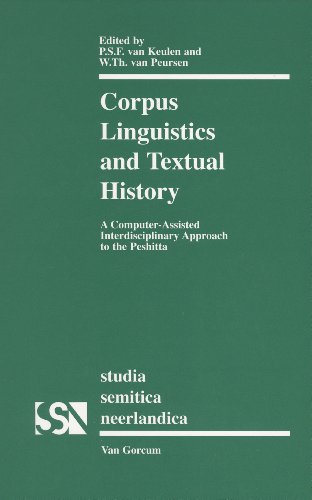

Most ebook files are in PDF format, so you can easily read them using various software such as Foxit Reader or directly on the Google Chrome browser.
Some ebook files are released by publishers in other formats such as .awz, .mobi, .epub, .fb2, etc. You may need to install specific software to read these formats on mobile/PC, such as Calibre.
Please read the tutorial at this link: https://ebookbell.com/faq
We offer FREE conversion to the popular formats you request; however, this may take some time. Therefore, right after payment, please email us, and we will try to provide the service as quickly as possible.
For some exceptional file formats or broken links (if any), please refrain from opening any disputes. Instead, email us first, and we will try to assist within a maximum of 6 hours.
EbookBell Team

4.0
16 reviews
ISBN 10: 9023241940
ISBN 13: 9789023241942
Author: Percy Van Keulen, Willem Th Van Peursen
Over the years the use of computers for research has become increasingly important in Biblical Studies. However, a combination of computational linguistics with diachronic text-critical and text-historical approaches has hardly ever taken place. Quite often, there is mutual misunderstanding between computational linguistics and more traditional approaches in the field of linguistics and textual analysis. For example, in computer-assisted research of modern text corpora it is common to treat the text as an unequivocal and unidimensional sequence of characters. In Biblical Studies, however, either text is considered an abstraction, the result of a scholarly reconstruction based on the extant textual witnesses. Here a fundamental difference in approach reveals itself.
The present volume tries to overcome the misunderstanding between the various disciplines and to establish how a fruitful interaction of information technology, linguistics and textual criticism, can contribute to the analysis of ancient texts. It addresses questions concerning the confrontation between synchronic and diachronic approaches, the role of linguistic analysis in the interpretation of texts, and the interaction of linguistic theory and the analysis of linguistic data.
The first section of this volume contains the papers presented at the CALAP seminar 2003. In the second section different aspects of the interdisciplinary analysis are applied to a selected passage from the Peshitta of Kings.
Introduction
CALAP: An Interdisciplinary Debate between Textual Criticism, Textual History and Computer-Assisted Linguistic Analysis
How to Transfer the Research Questions into Linguistic Data Types and Analytical Instruments
A Discourse on Method: Basic Parameters of Computer-assisted Linguistic Analysis on Word Level
Response to ‘A Discourse on Method’ by Hendrik Jan Bosman and Constantijn J. Sikkel
Response to Pier G. Borbone
On not Putting Descartes before D. Hume: Balancing Rationalism and Empiricism in Corpus Tagging
Response to A. Dean Forbes
Data Preparation: What are we Doing and Why Should we?
Response to ‘Data Preparation: What are we Doing and Why Should we?’ by Janet W. Dyk
Three Approaches to the Tripartite Nominal Clause in Syriac
Comments on ‘Three Approaches to the Tripartite Nominal Clause in Syriac’ by Wido van Peursen
Comments on ‘Three Approaches to the Tripartite Nominal Clause in Syriac’ by Wido van Peursen (second response)
A Response to ‘Three Approaches to the Tripartite Nominal Clause in Syriac’ by Wido van Peursen and a Bit More
Response to the Responses
Points of Agreement between the Targum and Peshitta Versions of Kings against the MT: a Sounding
A Reply to ‘Points of Agreement between the Targum and Peshitta Versions of Kings against the MT’ by Percy S. F. van Keulen
Response to ‘Points of Agreement between the Targum and Peshitta Versions of Kings against the MT’ by Percy S. F. van Keulen
Textual Features of the Peshitta of 1 Kings 2:1-9
Worked Examples from 1 Kings 2:1-9: Word Level Analysis
1 Kings 2:1-9: Some Results of a Structured Hierarchical Approach
Lexical Correspondence and Translation Equivalents: Building an Electronic Concordance
Nominal Clauses in the Peshitta of 1 Kings 2:1-9
Exegetical and Text-Historical Differences from the MT in the Peshitta Version of 1 Kings 2:1-9
Epilogue: The Peshitta of 1 Kings 2:1-9 from a Linguistic and a Text-Historical Perspective
Index of Passages
Index of Authors
corpus linguistics byu
corpus linguistics and language variation
corpus linguistics r
historical corpus linguistics
history of corpus linguistics tabular form
history of corpus linguistics pdf
corpus linguistics journals
Tags: Percy Van Keulen, Willem Th Van Peursen, Linguistics, Computer